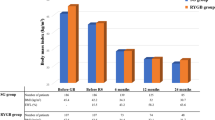Abstract
Background
Bariatric surgery outcomes have been examined in Germany since January 1, 2005. All data were registered prospectively in cooperation with the Institute of Quality Assurance in Surgery at the Otto-von-Guericke University Magdeburg.
Methods
The data were collected from an online data bank. Data collection began in 2005 for gastric banding (GB) and Roux-en-Y gastric bypass (RYGB) results. In addition to primary bariatric operations, data regarding the complications of revision procedures and redo operations were analyzed. Participation in the quality assurance study was required for all certified centers in Germany.
Results
RYGBs are a popular redo operation after failed gastric banding. In the German Bariatric Surgery Registry (GBSR), we analyzed data from 263 RYGB operations that used a one-step approach after GB and 116 operations that used a two-step approach. The leakage rates for primary RYGB decreased to 1.8 %. The incidence of leakage after a one-step RYGB after GB was lower (1.9 %) than after the two-step procedure (2.6 %).
Conclusion
RYGBs are popular procedures after failed GB in Germany. The multivariable analysis for overall intraoperative complications revealed a significant difference between the two-step and the one-step procedure. In an unadjusted and multivariate assessment, the one-step procedure had statistically lower general postoperative complications than the two-step approach. Therefore, we suggest performing band removal and RYGB as a one-step procedure. Further analysis is necessary to evaluate the risk factors for the one-step procedure. Follow-up investigations must be performed to determine whether RYGB is an effective and safe option after GB.
Similar content being viewed by others
References
Lampert T. Übergewicht und Adipositas in Deutschland. RKI Epidemiologisches Bull. 2007;18:155–6.
Mensink GBM, Schienkewitz A, Haftenberger M, Lampert T, Ziese T, Scheidt-Nave C. Übergewicht und Adipositas in Deutschland. Ergebnisse der Studie zur Gesundheit Erwachsener in Deutschland (DGES1). Bundesgesundheitsbl. 2013;56:786–94.
O’Brien PE, Macdonald L, Anderson M. Long-term outcomes after bariatric surgery: fifteen-year follow-up of adjustable gastric banding and a systematic review of the bariatric surgical literature. Ann Surg. 2013;257:87–94.
Buchwald H, Oien DM. Metabolic/bariatric surgery worldwide 2011. Obes Surg. 2013;23:427–36.
Stroh C, Weiner R, Horbach T, Ludwig K, Dressler M, Lippert H, et al. New data on quality assurance in bariatric surgery in Germany. Zentralbl Chir. 2013;138:180–8.
Cadière GB, Himpens J, Bazi M, Cadière B, Vouche M, Capelluto E, et al. Are laparoscopic gastric bypass after gastroplasty and primary laparoscopic gastric bypass similar in terms of results? Obes Surg. 2011;21(6):692–8.
Robert M, Poncet G, Boulez J, Mion F, Espalieu P. Laparoscopic gastric bypass for failure of adjustable gastric banding: a review of 85 cases. Obes Surg. 2011;21:1513–9.
Worni M, Østbye T, Shah A, et al. High risks for adverse outcomes after gastric bypass surgery following failed gastric banding: a population-based trend analysis of the United States. Ann Surg. 2013;257:279–86.
Apers JA, Wens C, van Vlodrop V, et al. Perioperative outcomes of revisional laparoscopic gastric bypass after failed adjustable gastric banding and after vertical banded gastroplasty: experience with 107 cases and subgroup analysis. Surg Endosc. 2013;27:558–64.
Hii MW, Lake AC, Kenfield C, Hopkins GH. Laparoscopic conversion of failed gastric banding to Roux-en-Y gastric bypass: short-term follow-up and technical considerations. Obes Surg. 2012;22:1022–8.
Coblijn UK, Verveld CJ, van Wagensveld BA, Lagarde SM. Laparoscopic Roux-en-Y gastric bypass or laparoscopic sleeve gastrectomy as revisional procedure after adjustable gastric band—a systematic review. Obes Surg. 2013;23:1899–914.
Morais AA, Faintuch J, Leal AA, Noe JA, Bertollo DM, Morais RC, et al. Inflammation and biochemical features of bariatric candidates: does gender matter? Obes Surg. 2011;21:71–7.
Slegtenhorst BR, van der Harst E, Demirkiran A, de Korte J, Schelfhout LJ, Klaassen RA. Effect of primary versus revisional Roux-en-Y gastric bypass: inferior weight loss of revisional surgery after gastric banding. Surg Obes Relat Dis. 2013;9:253–8.
Edholm D, Näslund I, Anders Karlsson F, Rask E, Sundbom M. Twelve-year results for revisional gastric bypass after failed restrictive surgery in 131 patients. Surg Obes Relat Dis. 2014;10:44–8.
Zingg U, McQuinn A, DiValentino D, Kinsey-Trotman S, Game P, Watson D. Revisional vs. primary Roux-en-Y gastric bypass—a case-matched analysis: less weight loss in revisions. Obes Surg. 2010;20:1627–32.
Acknowledgments
The German Nationwide Survey on Bariatric Surgery is supported by the Ministry of Research and Education Germany (BMBF) grant number 01GI1124. The responsible investigator is Christine Stroh. The following firms support the GBSR without any relation to their products: Johnson & Johnson MEDICAL GmbH, Ethicon Endo-Surgery Deutschland, Norderstedt Covidien Deutschland GmbH, and Neustadt/Donau. We thank all of the hospitals that participated in this study for their active engagement.
Conflict of Interest
The authors declare that there is no conflict of interest. Christine Stroh, Rudolf Weiner, Stefanie Wolff, Claudia Lerche, Christian Knoll, Thomas Keller, Thomas Manger and Christiane Bruns confirm that there are no links to firms whose products are mentioned in the article or to firms marketing a competing product. The topic is presented in an independent light and the information outlined is product neutral.
Author information
Authors and Affiliations
Consortia
Corresponding author
Rights and permissions
About this article
Cite this article
Stroh, C., Weiner, R., Wolff, S. et al. One Versus Two-Step Roux-en-Y Gastric Bypass After Gastric Banding—Data Analysis of the German Bariatric Surgery Registry. OBES SURG 25, 755–762 (2015). https://doi.org/10.1007/s11695-014-1527-0
Published:
Issue Date:
DOI: https://doi.org/10.1007/s11695-014-1527-0




